Neurodiversity Celebration Week ~ 2025
Celebrating an Inspiring Year 7 Assembly on Neurodiversity Awareness.
Celebrating an Inspiring Year 7 Assembly on Neurodiversity Awareness.
Mental Health Awareness Week, organised by Miss Gowdie (Psychology teacher) and the dedicated psychology prefects, was a vibrant and impactful event this year. Kicking off with a bake sale on Monday, May 13th, the generosity of our students was overwhelming. The sheer amount of treats donated allowed us to host a second bake sale on Tuesday, May 14th, during both break and lunch times. To further raise awareness, Thursday, May 16th, was designated as "Wear Green Day." Students showed their support by donning green attire or accessories and contributing donations to YoungMinds and Place2Be charities. The week culminated in a dynamic "Move Day" on Friday, May 17th, where both students and teachers participated in an array of activities including races, juggling, hula-hooping, and kick-up competitions. The energy and enthusiasm were palpable, creating a lively atmosphere that resonated throughout the school.
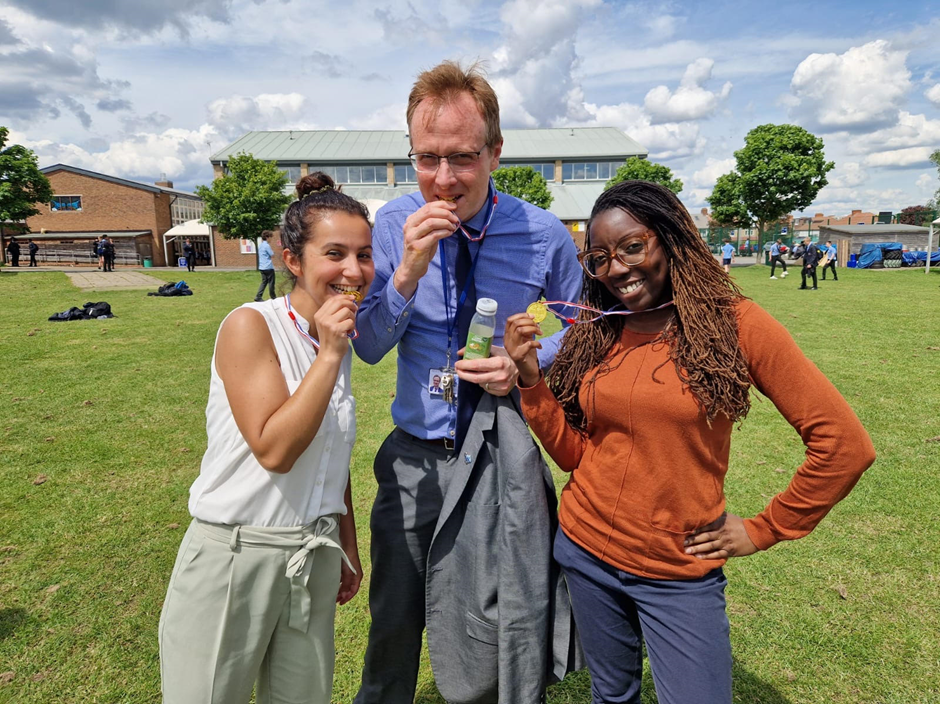
Here are statements from our dedicated psychology prefects, Princela and Farida, reflecting on the week's activities and their impact on our school community.
To promote Mental Health Awareness Week, I, along with some of the other Senior Prefects, helped give an assembly to the Year 7s, during which we discussed the importance of mental health awareness, the signs to look out for in yourself and others, as well as coping strategies. This assembly was very successful! Some of the events of the week included a Bake Sale, Wear A Green Item Day and Move For Mental Health, which included lunchtime activities on the Friday. The Bake Sale managed to raise a total of £109.50! All of which will be donated to mental health charities ‘Young Minds’ and ‘Place2Be’!
Princela
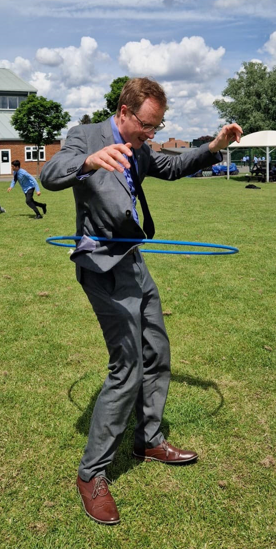 For the ‘Wear a Green Item Day’, students were encouraged to bring in a green item to raise awareness for the two chosen charities, ‘Young Minds’ and ‘Place2Be’.
For the ‘Wear a Green Item Day’, students were encouraged to bring in a green item to raise awareness for the two chosen charities, ‘Young Minds’ and ‘Place2Be’.
Move for Mental Health (lunchtime activities), was a very eventful and successful lunch where not just students of all year groups, but teachers too engaged in multiple activities at lunch to get them moving! We had a variety of juggling, hula-hooping, keepy-uppy competitions and a race! Some winners of each competition even got special medals as a reward for their accomplishments. Overall, it was a fantastic way to keep everyone engaged and moving!
Farida
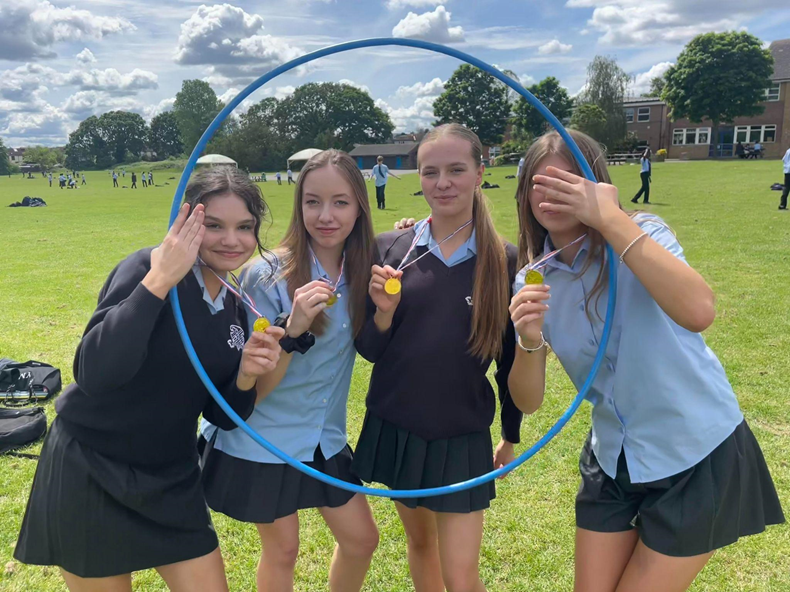

This was the first year that BGS has participated in Neurodiversity Celebration week, and we are looking forward to continuing to do so and making it even bigger and better in the years to come. Watch this space!
Please read on to hear more from some of the students themselves.
Mrs Meyer, Assistant Headteacher and SENCo
Mrs Sitch, Higher Level Teaching Assistant (SEND department)
I was diagnosed with autism when I was in Year 9, aged 13. Unfortunately, autism is often diagnosed a lot later in girls, if diagnosed at all, when compared to boys, because we are more prone to doing something called masking, which is hiding symptoms whether that’s intentional or subconscious. For me, the main symptoms I face are sensory difficulties, especially regarding food and noises, anxiety, “black and white” thinking, and thriving with a strict routine. Since being diagnosed, I’ve learnt more about my condition, allowing me to better manage things that I would have previously struggled with. The best way to support those around you that may be neurodiverse is to treat them like any other person, but acknowledge any difficulties they may have, and help accommodate them to the best of your ability, without shaming them or condescending them. In a school environment, it’s helpful for teachers to know anything that could be a struggle for me, so that they will be better equipped to help me should any problems arise. In my personal life, it’s also been helpful to reach out to other neurodivergent people, so I can have conversations with people who understand me very well. Whilst being autistic can make life challenging for me, I also love how I’m able to see the world in a completely unique way, and how I’m able to appreciate little details that neurotypical people may not pay attention to in the same way, and I know many other neurodivergent people feel similarly, and so I believe it’s really important to celebrate neurodiversity. Happy neurodiversity celebration week!
Lois, Year 12
I would like to speak about my diagnosis.
I was put forward for a screening for dyslexia in Year 4 due to the lack of consistency in written work. My written work wasn't living up to the standards of other areas of my work. My spoken communication was very good, but it wasn’t transferring on a page. Also, my reading wasn’t as fluent as it should be. Subjects like maths were always my strong point. I finally had a full diagnosis in Year 5 and found out I had dyslexia. Straight after, I was also diagnosed with Irlens Syndrome which meant I needed coloured glasses. Mine were green. Irlens is when you cannot read things right. For me, I saw rivers down the page and words that were all jumbled up. I thought it was normal when I was younger until I tried my Irlens glasses on. That was like magic. Everything stopped moving around, and no rivers were seen. After that, I started to work on my reading and writing skills, and it led me here. My diagnosis helps me identify areas that I find difficult and why I find them difficult.
Things that I find difficult are if people make fun of my glasses and say stuff like “you’re cheating” in tests because I have extra time. When people say mean things, it makes me not want to wear my glasses, but I need to because it will affect my learning. My glasses are stuck with me for life, so making comments on them makes me feel really bad about myself. Just because I wear green glasses doesn’t mean I’m stupid or slow, it just means I process things differently.
If you think there is something wrong with your learning, or you feel that you might need a screening or a test, don’t be quiet about it, speak to a parent and doctor so that you don’t have to go through learning difficulties alone.
Florence, Year 7
I wanted to participate in Neurodiversity Week to not only help inform more people about neurodiverse conditions but also learn about some things myself, as I personally was diagnosed with Autism when I was very young, but I never properly knew what that meant for me, so I was mostly in the dark on what being neurodiverse actually meant.
A Year 10 student
I feel as though, in our society, people with neurodiversity are underrepresented and underappreciated, so I wanted to help spread the message about the strengths of these differences and the importance of respecting and celebrating them.
It was a pleasure to speak to different year groups in assembly to spread this message and hopefully make other people think about the topic and about their actions.
I would really encourage everyone to do some further research into neurodiversity as it is a topic that can broaden your perspective of the world and strengthen your empathy for others. It is a topic that is often overlooked and not discussed enough, but if everyone puts in a small effort, we can change that.
 Louis, Year 10
Louis, Year 10
 What is neurodiversity?
What is neurodiversity?Everyone has a differently-wired brain and their own unique way of thinking, interacting and experiencing the world. Neurodiversity is based on the concept that neurological variances should be recognised and respected just like any other human variation, such as gender, race or sexual orientation. Neurodiversity is about recognising that everyone’s brain works differently.
 No Human Brain Is Exactly Alike
No Human Brain Is Exactly AlikeThere is no ‘standard’ human brain against which all other human brains can be compared. On the contrary, the human brain is so complex that no brain is exactly alike. The wide range of natural neurological variations of the brain affect the way that people think, learn and process information. So, during Neurodiversity Week, we're celebrating this uniqueness. We're recognising that every brain is wired differently. It's all about understanding and accepting that each of us learns and sees the world in our own way.
Imagine a world where everyone looked the same, talked the same, and thought the same. Sounds pretty boring, right? That's because it is! Our differences are what make the world exciting, vibrant, and full of possibilities. Whether it's the way we look, the way we speak, or the way our brains work, each of us brings something unique to the table. And you know what? That's something to celebrate, not judge. Respecting differences isn't just about being nice to each other – it's about recognising the value in differences. It's about understanding that just because someone is different from you, it doesn't make them any less important or worthy of respect. Instead of seeing these differences as something unusual or strange, Neurodiversity Celebration Week is all about appreciating and honouring the wide spectrum of neurological variations. Our brains are incredibly intricate, much like fingerprints – no two are exactly alike.
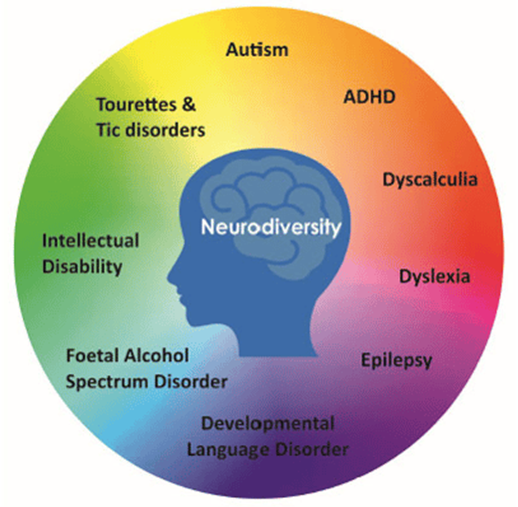 Some of the different ways of thinking, learning, interacting and perceiving the world have been given labels. For example:
Some of the different ways of thinking, learning, interacting and perceiving the world have been given labels. For example:
But before we dive into understanding how these neurological differences affect the brain, let's take a moment to highlight their strengths. Each of these labels represents a unique way of experiencing the world. So, as we explore these differences, let's keep in mind the incredible strengths that come with them. Because when we focus on strengths rather than limitations, we can better appreciate the diverse talents and abilities that each of us brings to the table.

For example, one of the remarkable strengths associated with ADHD is hyperfocus. While attention can sometimes be challenging to maintain, individuals with ADHD often have the ability to hyperfocus intensely on tasks they find engaging or interesting. This can lead to bursts of incredible productivity and innovation, where they can accomplish tasks with remarkable efficiency and creativity.
Individuals on the autism spectrum often have a remarkable attention to detail. They possess the ability to notice patterns and discrepancies that others might overlook, thanks to their keen observation skills. This attention to detail can be incredibly valuable in various fields, such as science, engineering, and the arts, where precision and accuracy are paramount.
These are just a couple of examples of the many strengths that neurodivergent individuals have. Each person's unique neurodiversity offers a wealth of talents and abilities that enrich our communities and contribute to the diversity of thought and perspective that makes our world so vibrant.
About 4% of the population have Attention deficit Hyperactivity Disorder. It affects a person's ability to regulate attention, control impulses, and manage hyperactivity. Some can also have difficulties in regulating emotions, leading to mood swings, irritability, or emotional outbursts. People with ADHD can be some of the most creative members of a team, bringing energy and new approaches to their projects. Several studies have shown that people with ADHD tend to be out-of-the-box thinkers and calm under pressure. It is important to note that these strengths and weaknesses can vary greatly depending on the individual.

About 2% of the population has Autism. Autism affects how a person perceives the world, interacts and socialises with others. This can make it challenging for them to pick up social cues and interpret them. People with Autism can be sensitive to lights, noise, touch and smells, which can sometimes cause them distress. Sometimes, social Interaction can be difficult. There can be difficulty understanding social cues, body language, and unwritten social rules, which can make social interactions challenging. This may lead to feelings of isolation or difficulty forming friendships.
However, they can be highly logical and can be good at absorbing and remembering facts, attention to detail, and recognising patterns. They also possess many qualities that make a great friend, such as loyalty, honesty and acceptance of others.
It is important to mention that not everyone who has a neurodivergent condition such as autism presents in the same way. It is possible for people to experience different characteristics, and that is why it is sometimes referred to as being on a ‘spectrum’. Stereotypes should be avoided at all costs.
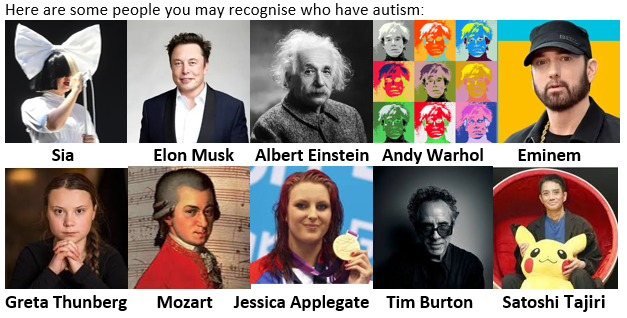
About 10% of the population are dyslexic and 10-15% have Irlens. These are language processing difficulties that can cause challenges with reading, writing and spelling. It's the brain's inability to process information correctly causing words to move or distort on a page. It can cause challenges with processing information quickly, organisation and sequencing. To help with reading, they can use different coloured paper, a clear coloured plastic overlay or coloured glasses to help them see the words clearer.
Here is an example of what someone with dyslexia sees:

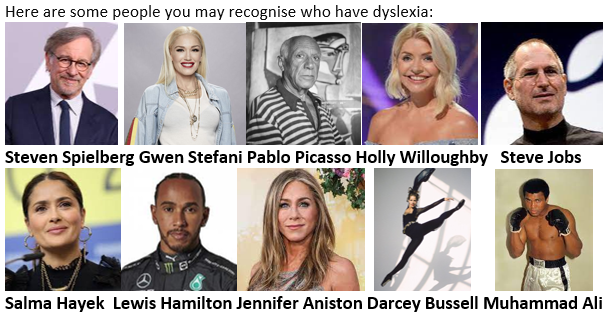
About 6% of the population are dyspraxic. Dyspraxia affects your physical coordination. Sometimes dyspraxia can be misperceived as clumsiness. Dyspraxia can affect your fine motor skills, such as your handwriting, ability to tie your shoes and doing up buttons. It can also affect your gross motor skills, such as being able to catch and kick a ball, run and ride a bicycle. Dyspraxia can also affect your ability to organise yourself. Dyspraxic people are creative, determined and really good at developing their own strategies to overcome difficulties.
About 5% of the population have dyscalculia. Dyscalculia affects an individual’s ability to acquire and use mathematical skills. For some, it affects how they see numbers. For others, it might make symbols difficult to read, or they may have trouble understanding finances, data and using numbers in everyday life. People with dyscalculia often have strengths such as intuitive and strong strategic thinking, are very creative and have a love of words.
About 1% of the population have Tourette Syndrome. Tourette Syndrome causes sudden, uncontrolled, repetitive muscle movements or sounds called “tics”.
Stressful situations can make the tics more frequent, longer and more severe.
Living with Tourette's requires resilience, adaptability, and courage. Creativity often shines brightly in individuals with Tourette's. Many have a natural flair for artistic expression, whether it's through painting, writing, music, or other forms of creativity. They are often high-achieving, creative and empathetic.
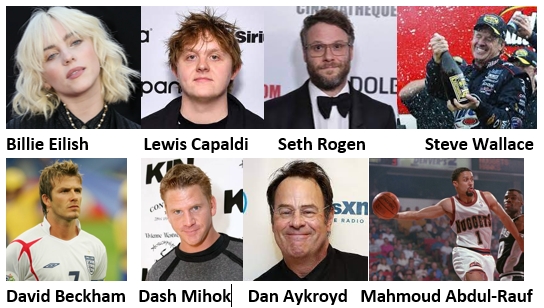
Neurodiversity Week is a celebration, an opportunity for us to come together and embrace the beautiful spectrum of neurological differences that exist among us. It's about recognising and honouring the unique strengths, talents and perspectives that neurodiverse individuals bring to our community.
So let's learn, let's empathise, and let's celebrate Neurodiversity Week, because understanding and acceptance are the keys to building a truly inclusive and compassionate society.
There are several free webinars this week (see below) that can be signed up for via https://www.neurodiversityweek.com/events along with more information about worldwide Neurodiversity Celebration Week at www.neurodiversityweek.com/
Mrs Meyer, Assistant Headteacher and SENCo
Mrs Sitch, Higher Level Teaching Assistant (SEND department)
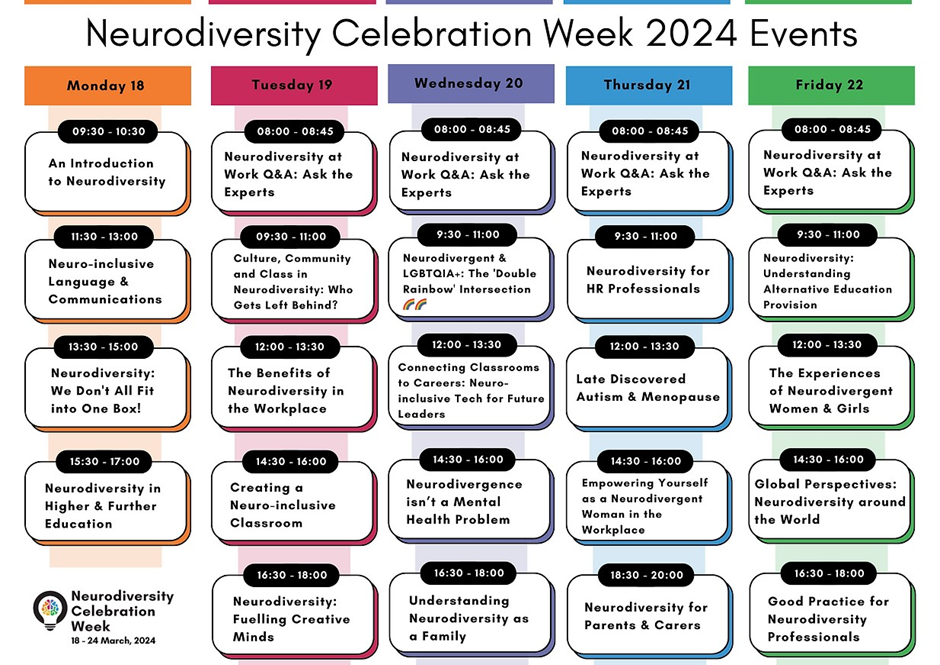
Cookie Policy